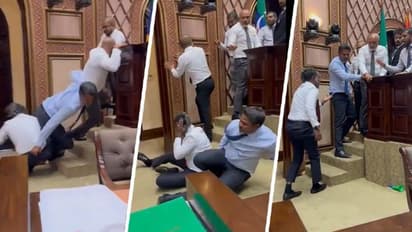Turmoil in Muizzu’s Maldives: Physical altercation erupts in Parliament amid cabinet approval vote (WATCH)

Synopsis
The political landscape in Maldives is witnessing a standoff as the primary opposition party in the island nation has refused to grant approval for four members nominated for President Mohamed Muizzu’s cabinet.
The Maldives Parliament plunged into disarray as a critical vote on the approval of Muizzu's Cabinet unfolded amidst scenes of chaos and disruption. The parliamentary session, intended to determine the composition of President Mohamed Muizzu's cabinet, quickly escalated into a political standoff, highlighting the deep-seated divisions and power struggles within the island nation's political landscape.
The political turmoil erupted as opposition Members of Parliament (MPs) found themselves barred from entering the parliamentary chamber, while ruling party MPs sought to obstruct the speaker from conducting the session. This clash between the opposition and ruling party factions underscored the underlying tensions and challenges confronting democracy in the Maldives.
At the center of the political standoff lies the opposition's refusal to grant approval for four key members of President Muizzu's cabinet. The Maldivian Democratic Party (MDP), along with its allies, wielded significant influence in the parliamentary decision-making process, withholding support for designated cabinet members and raising concerns about their suitability for office.
The denial of approval by opposition parties, including The Democrats, signals a broader dissatisfaction with President Muizzu's administration and its policy agenda. The rejection of cabinet nominees reflects deep-rooted ideological differences and a lack of consensus on key issues facing the Maldives, exacerbating political instability and uncertainty.
The government's response to the opposition's stance has been met with criticism, with accusations of deliberate attempts to undermine democratic processes and hinder the functioning of governance. The ruling Progressive Party of Maldives (PPM) and People’s National Congress (PNC) coalition have expressed concerns about the implications of the opposition's actions for political stability and effective governance.
The political deadlock comes against the backdrop of simmering tensions over the government's foreign policy stance, particularly its perceived anti-India rhetoric and growing alignment with China. The opposition has raised objections to what they perceive as a shift away from longstanding diplomatic alliances, warning of potential repercussions for the country's development and international relations.
As the political impasse unfolds, the future trajectory of governance in the Maldives remains uncertain. The need for constructive dialogue, compromise, and respect for democratic principles has never been more urgent. The resolution of the current crisis requires a concerted effort by all stakeholders to prioritize the interests of the Maldivian people and uphold the principles of democracy, transparency, and accountability. Only through meaningful engagement and collaboration can the Maldives navigate its way towards political stability and national unity.
Check the Breaking News Today and Latest News from across India and around the world. Stay updated with the latest World News and global developments from politics to economy and current affairs. Get in-depth coverage of China News, Europe News, Pakistan News, and South Asia News, along with top headlines from the UK and US. Follow expert analysis, international trends, and breaking updates from around the globe. Download the Asianet News Official App from the Android Play Store and iPhone App Store for accurate and timely news updates anytime, anywhere.